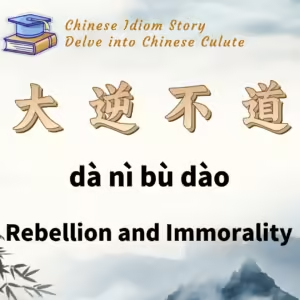
Chinese Idiom: 一去不复返 (Yi Qu Bu Fu Fan)
English Translation: Never to Return
pīn yīn: yī qù bù fù fǎn
Idiom Meaning: Originally, it means that once someone leaves, they will never return. Nowadays, it is often used to describe something that has passed and cannot reoccur. “返” means to come back.
Historical Source: Strategies of the Warring States – Strategies of Yan, also found in Records of the Grand Historian – Biography of the Assassins.
Idiom Story: In 227 BC, the fourth year of King Zheng of Qin’s wars to unify China, the Qin army had conquered the states of Han and Zhao and was approaching the borders of Yan, reaching the Yi River (modern-day Yi County, Hebei Province). Facing imminent danger, Crown Prince Dan of Yan, who had once been a hostage in Qin, knew he couldn’t resist the Qin forces. Thus, he decided to send the assassin Jing Ke, along with the head of General Fan Yuqi (who had defected from Qin to Yan) and a map of the region of Dukang (modern-day Zhuoxian County, Hebei Province), to assassinate the King of Qin.
On the day of departure, Crown Prince Dan and Jing Ke were acutely aware that this mission was a one-way journey—Jing Ke was unlikely to return. Therefore, Crown Prince Dan, along with Jing Ke’s friends such as Gao Jianli, dressed in white mourning clothes and escorted him to the banks of the Yi River. Gao Jianli played a mournful tune on the zhu (an ancient musical instrument), and Jing Ke sang in response:
“Wind soughing, Yi River cold, The brave man goes, never to return.”
The lyrics roughly translate to: “The north wind blows cold by the Yi River; the brave man goes forth, never to return!” The song was so somber and stirring that all the warriors glared, and their hair stood on end.
After the song, Jing Ke, with Qin Wuyang accompanying him, boarded the carriage without looking back.
Upon arriving in the Qin capital of Xianyang, the King of Qin held a grand reception in the Xianyang Palace. Jing Ke carried a box containing Fan Yuqi’s head, while Qin Wuyang carried the map. Step by step, they ascended the palace steps.
Seeing the majestic Qin court, Qin Wuyang was overcome with fear and visibly trembled. The courtiers of Qin found this suspicious—why would a mere envoy show such fear? Jing Ke, maintaining his composure, explained to the King of Qin: “He is a rough man from the north and has never seen the grandeur of Your Majesty, hence his fear.” The King of Qin, also wary, ordered Qin Wuyang to step back and told Jing Ke to present the map.
Jing Ke took the map from Qin Wuyang and presented it to the king. As the king opened the map, Jing Ke pointed to different places on it. When the map was fully unrolled, it revealed a hidden dagger. Jing Ke seized the king’s sleeve with his left hand and reached for the dagger with his right, attempting to stab the king. The king, startled, jerked back, tearing his sleeve, and tried to draw his sword. In his panic, he struggled to unsheathe it due to its length. He ran around a large bronze pillar with Jing Ke in pursuit.
The unarmed courtiers on the dais were helpless, and the armed guards below, bound by protocol, could not intervene. A few desperate courtiers rushed forward, striking Jing Ke with their hands. A physician attending to the king threw his medicine bag at Jing Ke. This distraction allowed the king to finally draw his sword, and he struck Jing Ke, severing his left leg. Jing Ke, unable to stand, threw the dagger at the king but missed, hitting the bronze pillar. The king then delivered several more blows, and his guards rushed in to kill Jing Ke. Qin Wuyang, waiting below, was also killed by the Qin soldiers.
Jing Ke’s act of sacrificing himself for righteousness and defying tyranny was highly praised by the great historian Sima Qian, who wrote, “His intent was clear, he did not betray his will, and his name endures through the ages.” During the Eastern Jin Dynasty, Tao Yuanming also expressed his admiration and regret, saying, “Alas, his swordsmanship was insufficient, and his great deed was unfulfilled. Though he is gone, his spirit lingers for a thousand years.”
The lyrics “The brave man goes, never to return” were later simplified and generalized into the idiom “Never to Return” (一去不复返).






